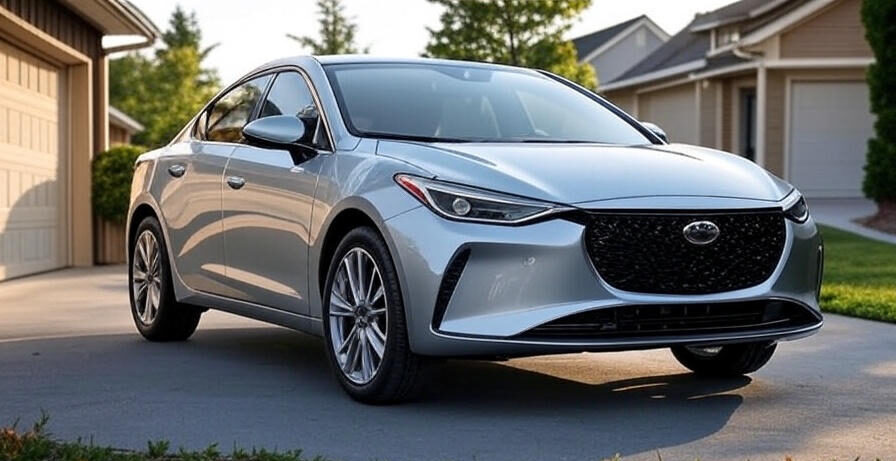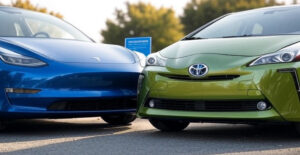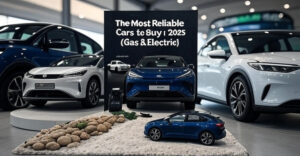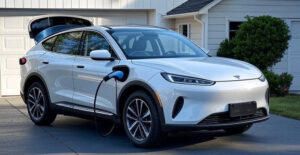Summary
Alright, so you’ve got your eye on an electric car but you’re not exactly rollin’ in crypto money or ready to drop 50 grand on a shiny new Tesla. Maybe you’ve noticed some tempting used EV deals online — a pre-loved Nissan Leaf for under $10k, a sleek Chevy Bolt with only 30k miles — and you’re thinkin’, “Hmm… should I take the plunge?”
Good news: you’re not alone. Used electric cars are havin’ a moment right now, especially in 2025 as more people upgrade to bigger batteries and longer ranges. But before you swipe that credit card or Venmo your life savings to some sketchy dude on Facebook Marketplace, let’s talk real talk: buying a used EV ain’t exactly like buyin’ a used Corolla. There’s big rewards… and a few hidden risks if you’re not careful.
Grab your coffee (or matcha, you fancy eco-warrior) and let’s break down exactly what you’re in for — the good, the bad, and the battery.
Why More People Are Buying Used EVs in 2025
The electric car market’s changed like crazy in the last decade. Back in the early days, buying an EV meant shellin’ out big bucks for a tiny hatchback that barely went 80 miles before beggin’ for a charge. Now? Even a budget EV can hit 250+ miles easy. So, early adopters are tradin’ up for the new models, leavin’ a nice pile of used EVs ready for bargain hunters like you.
Plus:
- Depreciation hits EVs faster than gas cars (more on that in a sec), so you can snag a solid ride for half the original price.
- More states now offer used EV incentives, so you might even get some free money back.
- Gas prices? Don’t get me started. Used EV means you’re stickin’ it to Big Oil while savin’ big bucks every month.
The Rewards: Why Buying a Used EV is Smart
Let’s get to the fun part first — the upsides that’ll make you wanna click “buy now.”
1. Huge Savings Upfront
This one’s obvious. Most EVs lose value faster than a gas car, partly because battery tech improves every year. That shiny $40k Bolt from 2020? It might be yours for $16k today.
2. Cheaper to Drive
No oil changes, no gas stops, fewer moving parts that break. You’ll spend way less on maintenance — especially if the battery and drivetrain warranty’s still kickin’.
3. Environmentally Friendlier
You’re givin’ a second life to a car that’s already built. That’s huge for your carbon footprint. Plus, you’ll be burnin’ zero dino juice while you zip around town.
4. Surprise Perks
Many older EVs still come with perks like free charging at some public stations. Some brands — like Tesla — used to toss in unlimited Supercharging on certain cars. If you find one with that perk, jackpot!
The Risks: What You Need to Watch Out For
Now for the not-so-sexy stuff — the pitfalls that can turn your sweet deal into a driveway paperweight.
1. Battery Health
This is the biggest question mark with any used EV. Batteries degrade over time, especially if the previous owner treated it like a disposable vape.
Most modern batteries last 8-15 years, but check the state of health (SOH). Some early Nissan Leafs? They’re known for battery fade — a 100-mile range new might be 60 miles now.
2. Outdated Charging Speeds
Older EVs may not fast charge as quickly as newer models. Or worse, they might not be compatible with today’s newest fast chargers.
3. Warranty Limbo
Some used EVs are out of warranty, especially if they’re older than 8 years or over 100k miles. That means any big battery repair is on you — and trust me, you don’t wanna see that invoice.
4. Weird Repair Costs
EVs generally need less maintenance, but when somethin’ breaks, it can cost ya. You can’t take your Tesla to any ol’ Joe’s Garage. Specialized parts and labor can be pricy if you’re not prepared.
How to Shop Smart for a Used EV in 2025
Okay, you’re still here — which means you ain’t scared off yet. Good. Let’s get you the knowledge to buy smart.
1. Know Your Range Needs
Be honest with yourself. Commutin’ 20 miles a day? An older EV with 80 miles of real-world range might be fine. Road trip king? You’ll want a newer battery that’ll go 250 miles minimum.
2. Get a Battery Health Report
Most dealers can pull a battery report. If they won’t, run. If you’re buyin’ private, ask the seller to show it from the car’s app or service center.
3. Check the Warranty Status
Look at both the basic bumper-to-bumper and the battery warranty. Many brands cover batteries for 8 years/100k miles — some longer. Tesla, Hyundai, Kia, and Nissan have decent coverage.
4. Verify Charging Compatibility
Make sure it works with your local Level 2 charger setup. For road trips, see if the car supports DC fast charging and your region’s network.
5. Test Drive with Your Daily Life in Mind
Bring your kid’s car seat. Try your driveway charger plug. Park in your garage. Make sure this ride actually fits your life.
Top Used EVs Worth Buying in 2025
Here’s some models folks love on the secondhand market:
✅ Tesla Model 3 (2018+) – Good range, fun to drive, OTA updates keep it fresh.
✅ Chevy Bolt EV (2020+) – Great bang for the buck, plus GM replaced a ton of batteries under recall.
✅ Hyundai Kona Electric (2020+) – Solid range and warranty, underrated gem.
✅ Nissan Leaf (2018+) – Cheap entry EV if you don’t need long range. Just check battery health!
✅ Kia Niro EV (2020+) – Practical hatch vibe, decent range, good warranty.

Real-World Example: Jamie’s Leaf
Jamie, my neighbor, grabbed a 2019 Leaf for $12k last year. He only drives 10 miles a day to work, so the 70 miles of range left is plenty. He charges in his driveway with a Level 1 plug overnight. After a year? He’s spent less than $100 total on “fuel.” His old Civic guzzled that in a month!
Handy Tips for First-Time Used EV Buyers
✅ Get a home charger setup — even a 240V dryer plug helps.
✅ Always test drive for real-world range, not just the dashboard number.
✅ Budget for tires — EVs are heavier, so tires wear faster.
✅ Check recall history — some older EVs had battery recalls you might actually benefit from.
✅ Don’t overpay — used EV prices drop fast as new models come out.
10-12 Q&A: Buying a Used Electric Car
1. Are used EVs really cheaper in the long run?
Usually! You’ll save on gas and oil changes, but always factor in battery health.
2. How long does an EV battery really last?
Most hold up well for 8-15 years. Newer chemistries are even better.
3. Should I buy from a dealer or private seller?
Dealers often offer limited warranties or CPO perks. Private sales can be cheaper but riskier.
4. Is it true EVs depreciate faster?
Yep — but that’s your gain when buyin’ used. You’re gettin’ more car for less.
5. What if the battery needs replacin’?
Oof, it can be $5k-$15k. That’s why a good warranty’s golden.
6. Can I check battery health myself?
Some brands have apps. You can also pay for an independent inspection at an EV shop.
7. Do older EVs still get software updates?
Tesla’s the king for OTA updates. Others vary. Check before you buy.
8. Should I get a home charger?
If you plan to keep it, yes. Level 2 is best for daily driving.
9. What about cold weather?
Older EVs can lose range faster in cold. Park indoors if you can, precondition the battery.
10. Can I get tax credits on used EVs?
In 2025, some states and the feds offer credits for used EVs — up to $4k in some cases!
11. Are there hidden fees to watch for?
Same as any car — doc fees, registration, maybe a battery check fee. Always ask upfront.
12. What’s your pick for best used EV?
Bang for buck? A 2021 Chevy Bolt with the new battery. Great range, cheap to buy, easy to fix.
Final Plug (Pun Intended)
So should you buy a used electric car? If you do your homework, check the battery, and know your daily needs — heck yeah! It’s one of the best ways to dip your toes into the EV world without breakin’ the bank.
Now go hunt down your deal, get that charger ready at home, and enjoy leavin’ the gas station behind for good. Happy (silent) motoring!









